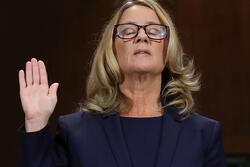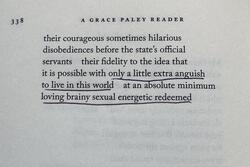One Year Later
It’s been just over a year since the world witnessed the bravery of Christine Blasey Ford. Her heartbreaking, earnest testimony in the wake of Brett Kavanaugh’s nomination to the Supreme Court brought the country to a standstill.
Over a year later, and especially in light of Deborah Ramirez’s brave new testimony, I still find myself thinking of Blasey Ford’s words on September 27, 2018. Aside from her heart-wrenching descriptions of her abuse at the hands of Kavanaugh, one thing stood out to me: how deferential and apologetic she was. She apologized when asking for coffee, apologized when asking for the restroom, and apologized when making corrections to her statement. But as Rabbi Leah Berkowitz noted last fall, this woman certainly owed no one an apology. On the contrary, I would argue that many, many people owe her one.
The timing of her testimony was poignant for me, considering it was only a week after Yom Kippur, the Jewish day of atonement. On this day, Jews are asked to repent for their sins of the past year by asking their friends, family, and community for forgiveness. Both a communal and individual obligation, Yom Kippur is considered the most solemn day on the Jewish calendar.
But what does this mean when women are constantly compelled (and feel obligated) to apologize? Women raise their hands in classrooms and start their comments by saying “sorry.” We send emails beginning with “sorry.” When we’re in charge of delegating tasks in the workplace, we start our directions with “sorry.” When we are abused and harassed, we apologize. Women apologize for perfectly reasonable behaviors that men simply wouldn’t think to apologize for. We apologize for having opinions, for doing our jobs, for asking questions, for simply existing.
We apologize for our own subjugation.
Why? We’ve been conditioned to understand that in order to be polite, in order to be “ladylike,” we must apologize. We have to make ourselves palatable because we aren’t in a position in our society to make outright demands and advocate for ourselves. First, we must perform an, albeit small, act of self-flagellation by apologizing.
We are conditioned to be people-pleasers. We are told we have to constantly put others’ needs before our own.
We are conditioned to take up as little space as possible, both literally and figuratively. Of the eight million people in the U.S. who have eating disorders, seven million are women. In meetings in the workplace, men speak more often and for longer periods of time. Only 6.6% of Fortune 500 CEOs in 2019 are women—up from a record low of 4.8% last year. Women are constantly bombarded with the message that we do not belong in the public eye or positions of power.
Too many of the attributes that men are expected to have, women are expected to apologize for. Men delegate, women are bossy. Men are impassioned, women are shrill. Men are fierce, women are bitches. We know this. And we are expected to feel guilty for it.
And there is proof. In a study published in the Journal of Psychological Science, researchers discovered that “women have a lower threshold for what constitutes offensive behavior.” Essentially, society’s tolerance is much lower for behavior deemed offensive when it comes from women. Our knee jerk reaction, then, has been to excessively apologize for things that wouldn’t make men bat an eye.
But we know that men aren’t (typically) ruder, right? Men don’t act in horrible, impolite ways more than we do, right? Of course not. It’s simply that men don’t have to apologize for the behaviors that make them successful. Women do.
So this Yom Kippur, I will look very critically at my list of the apologies I need to make to others, to myself, and to the world. When I make my atonements and my “sorries,” I will take extra time to consider what motivates each apology. Is this something my male friends would have to apologize for? Would it even cross their minds?
Here’s what I won’t be making amends for:
I will not apologize for taking up space. I am deeply proud of how much work I’ve done to cultivate my outspokenness in a culture that believes women should be seen and not heard. I wasn’t born with it. I certainly wasn’t taught it. It has taken years to be outwardly self-confident and stop acting meek and humble when I see my male peers act this way without thinking. It has taken years to learn how to raise my hand in class and say, “I disagree” after a male classmate has spoken. I will not apologize for it. Even if it comes across as surly.
I will not apologize for having to take a break. I am an activist and a feminist. And I hustle. This means that I occasionally need to step back and take care of myself. I need to be intentional about my self-care and I need to put myself first for my mental and physical health. That means that I have to say “no” to people sometimes. I have to establish boundaries.
I will not apologize for doing my job. When I work with others in a group setting, we all have tasks that contribute to the project. I will not apologize for asking them to participate, show up, and do their work. I will not apologize for sending reminders or setting deadlines. I will not apologize for taking the lead or reminding others that if they take the lead, they have to show up.
And I won’t apologize for being myself. I am a proud feminist. I am proudly outspoken. I am proudly stubborn. I am proudly myself, and this year I won’t make any apologies for that. I won’t next year, either.








I particularly like what was said about taking a break. I am a feminist and an activist, but I can no longer hustle. Yet I still try to function like a healthy 35 year old although I am 76 with some health challenges. In my need to be intentional about self-care, I must learn to say "no" sometimes, both to other people and to myself. The latter is the boundary I need to focus on. I appreciate the reminder.
One way we can join you in repairing the world is to address the likes of Brett Kavanaugh in K-12 schools, thereby sending a strong message that we won't tolerate this behavior as it progresses to college and the workplace. In the new year, please consider sharing the resources at SSAIS.org. JWA has featured Minnah Stein, a young activist associated with the organization as well as the founder. Thank you.